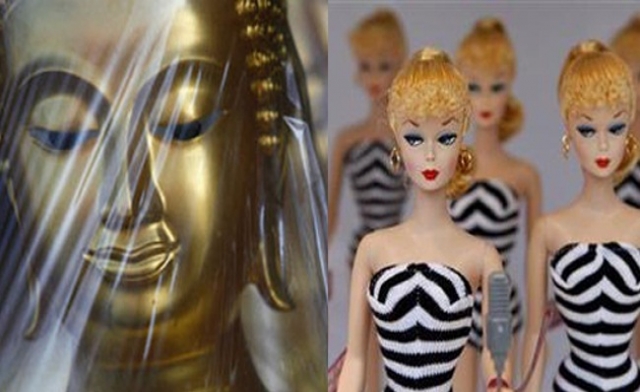February 18, 2013
جمع آوري مجسمه بودا و باربي


By EMAN EL-SHENAWI
AL ARABIYA
This week, Buddha statues have become the latest in a line of items banished from public sight as authorities show their opposition to “cultural invasion.”
The statues are believed to be stricken off a list of things allowed to appear in the country for their alleged portrayal of western and foreign influences.
Buddha statues have been labeled as symbols of “cultural invasion,” an official for the protection of Iran’s cultural heritage, Saeed Jaberi Ansari, was quoted in
the independent Iran-based Arman daily as saying.
But the Buddha ban, aiming to stop the promotion of Buddhism, has been the first time the Iranian government has shown an opposition to symbols from the east.
Critics of the move have slammed Iran’s alleged reasoning behind the decision and suggest the ban may fizzle out.
“Art is not an area the regime will succeed fighting against,” says Dr. Alireza Nourizadeh, the director of the Centre for Arab & Iranian Studies in London,
“This has nothing to do with not allowing sculptures or artworks in the country – like some Islamic countries. Iran does have its film and theater festivals, but it’s what you can call ‘circumcised’ arts,” adds Nourizadeh, in reference to the bans on the selected artistic or cultural items intended to shelter the country from foreign interference.
Good guys: Superman, Spiderman
In February last year, an Iranian government-affiliated agency banned dolls of the Simpsons cartoon characters, who joined Barbie and others on a toy blacklist.
Again, the reason being The Simpsons' banning was to avoid the promotion of Western culture. But strangely enough, Superman and Spiderman were allowed, because they helped the “oppressed.”
And as for the Buddha statue ban, a backlash may be expected.
“Artistic circles will speak out; Iranian intellectuals will respond sharply,” Dr. Nourizadeh says, adding that he expects the ministry of Islamic guidance to soon snub the decision.
“They may issue a statement, saying the move has nothing to do with the ministry and blame it on unauthorized officials after all, and may even order their punishment,” he added.
Continued ‘cleansing’
Meanwhile, Saeed Jaberi Ansari reportedly confirmed on Sunday that the “cleansing” would continue and authorities would not permit a specific belief to be promoted through such items. He did not say, however, how many Buddha statues had already been seized.
And authorities may have a particular problem with the statues; their influence on younger generations.
“The regime believes Iranian citizens, particularly the youth, are being corrupted by the West, foreign entities, imperialists, Zionists, you name it which encourages young people to leave Islamic values and Khomeini’s values.”
Some Iranians buy Buddha statues to decorate their homes and cars. Most are made in China and come from Iranian free-trade zones in the Gulf, according to a report by the Associated Press.
Under Iran’s constitution, Christian and Jewish beliefs as well as Zoroastrianism are recognized alongside Islam, the official religion. The law says that in general the rights of all non-Muslims should be observed.

